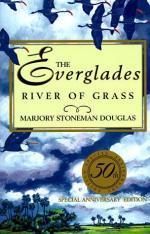
|
| Name: _________________________ | Period: ___________________ |
This test consists of 5 short answer questions, 10 short essay questions, and 1 (of 3) essay topics.
Short Answer Questions
1. The French were eventually chased out by _________________________ who eventually came to control Florida.
2. Why did many of the Indians die?
3. Both blacks and Indians had been given freedom and citizenship by Spanish Florida causing problems between Spanish and ___________ America that would continue for more than one hundred years.
4. These people are believed to have arrived in the Everglades around ________ AD.
5. For the next __________ hundred years, the Indians of Florida were left alone.
Short Essay Questions
1. Describe the first Indians in Florida. How do they compare to other tribes around the U.S?
2. Describe the funeral customs of the Tekesta. Why might they have done this?
3. Why was Mexico more desired than Florida?
4. Who did Carlos give Menendez as a wife? Why?
5. Describe the Floridian Plateau. How does this make it a plateau?
6. How did animals end up, and stay, in Florida? How did this affect the various species?
7. From where did the Indians of Florida originate? How did their adjustment to living in Florida compare to that of the animals?
8. Where are the Everglades located? Why is this important to this book?
9. How were the Native Americans treated by the European countries who sent out explorers? Why?
10. Describe the treaties signed by the Indians. Why did they sign these treaties?
Essay Topics
Write an essay for ONE of the following topics:
Essay Topic 1
Migrant workers have been important in Floridian agriculture.
Part 1) What is a migrant worker? What is the history of the migrant worker in Florida? How have they been important to Floridian agriculture? Why have they been so important? How are migrant workers still important in Floridian agriculture?
Part 2) How are migrant workers important throughout other parts of the U.S.? Why are they important elsewhere? Why might one become a migrant worker? Would you want to be a migrant worker? Why or why not?
Part 3) What issues has the U.S. had with migrant workers in recent history? How has this become a problem? How should our country handle this problem? Why?
Essay Topic 2
It took many centuries for the white man to control Florida.
Part 1) Describe the arrival and settling of the white man. Why did he come to Florida? What challenges did he face? How did he deal with these challenges? Why did he react this way?
Part 2) Why did it take so long for the white man to finally take control of Florida? What does this reveal about Florida and the Native Americans who lived there?
Part 3) How has this interest in controlling Florida affected this state today? How has control played an important role in the colonization and settling of other regions of the world? How has all of this control over native peoples and their environments affected our world today? Is this good or bad? Why?
Essay Topic 3
Attention was paid to the Everglades in the 1990s.
Part 1) Describe the attention paid to the protection of the Everglades prior to the 1990s. How did this attention change in the 1990s? Why did this attention and attitude regarding the Everglades change?
Part 2) Why was the Clinton administration so interested in protecting the Everglades? What does this interest in the environment reveal about the attitudes of those in the 1990s? Is this attitude still seen today? Why or why not?
Part 3) What is being done today to protect the Everglades and other environments and natural resources? Is this enough? Why or why not?
|
This section contains 1,210 words (approx. 5 pages at 300 words per page) |

|




